Medea: Evaluating the Effectiveness of Euripides' Play as Tragedy
VerifiedAdded on 2022/11/23
|8
|2717
|30
Essay
AI Summary
This essay examines Euripides' play, Medea, through the framework of Aristotelian tragedy. It explores the play's plot, character development, and thematic elements in relation to Aristotle's Poetics. The analysis focuses on the play's adherence to Aristotelian principles, including the structure of the plot, the presence of a tragic hero, and the elicitation of fear and pity in the audience. The essay argues that while Medea possesses certain characteristics of a tragedy, it deviates from Aristotle's ideal in terms of plot construction and characterization, ultimately questioning its classification as a fully effective Aristotelian tragedy. The essay also discusses the play's themes of revenge, betrayal, and the role of women in society.
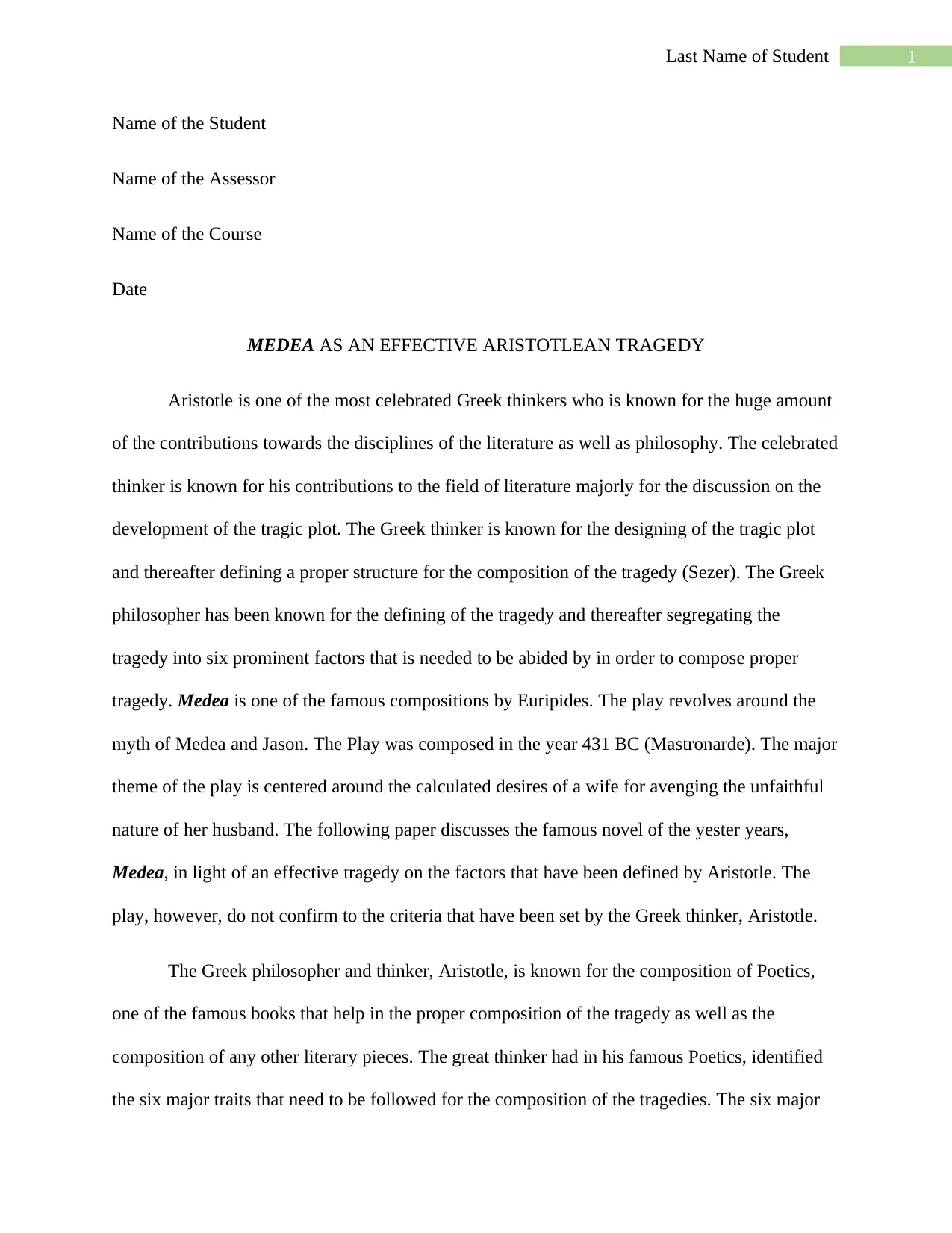
1Last Name of Student
Name of the Student
Name of the Assessor
Name of the Course
Date
MEDEA AS AN EFFECTIVE ARISTOTLEAN TRAGEDY
Aristotle is one of the most celebrated Greek thinkers who is known for the huge amount
of the contributions towards the disciplines of the literature as well as philosophy. The celebrated
thinker is known for his contributions to the field of literature majorly for the discussion on the
development of the tragic plot. The Greek thinker is known for the designing of the tragic plot
and thereafter defining a proper structure for the composition of the tragedy (Sezer). The Greek
philosopher has been known for the defining of the tragedy and thereafter segregating the
tragedy into six prominent factors that is needed to be abided by in order to compose proper
tragedy. Medea is one of the famous compositions by Euripides. The play revolves around the
myth of Medea and Jason. The Play was composed in the year 431 BC (Mastronarde). The major
theme of the play is centered around the calculated desires of a wife for avenging the unfaithful
nature of her husband. The following paper discusses the famous novel of the yester years,
Medea, in light of an effective tragedy on the factors that have been defined by Aristotle. The
play, however, do not confirm to the criteria that have been set by the Greek thinker, Aristotle.
The Greek philosopher and thinker, Aristotle, is known for the composition of Poetics,
one of the famous books that help in the proper composition of the tragedy as well as the
composition of any other literary pieces. The great thinker had in his famous Poetics, identified
the six major traits that need to be followed for the composition of the tragedies. The six major
Name of the Student
Name of the Assessor
Name of the Course
Date
MEDEA AS AN EFFECTIVE ARISTOTLEAN TRAGEDY
Aristotle is one of the most celebrated Greek thinkers who is known for the huge amount
of the contributions towards the disciplines of the literature as well as philosophy. The celebrated
thinker is known for his contributions to the field of literature majorly for the discussion on the
development of the tragic plot. The Greek thinker is known for the designing of the tragic plot
and thereafter defining a proper structure for the composition of the tragedy (Sezer). The Greek
philosopher has been known for the defining of the tragedy and thereafter segregating the
tragedy into six prominent factors that is needed to be abided by in order to compose proper
tragedy. Medea is one of the famous compositions by Euripides. The play revolves around the
myth of Medea and Jason. The Play was composed in the year 431 BC (Mastronarde). The major
theme of the play is centered around the calculated desires of a wife for avenging the unfaithful
nature of her husband. The following paper discusses the famous novel of the yester years,
Medea, in light of an effective tragedy on the factors that have been defined by Aristotle. The
play, however, do not confirm to the criteria that have been set by the Greek thinker, Aristotle.
The Greek philosopher and thinker, Aristotle, is known for the composition of Poetics,
one of the famous books that help in the proper composition of the tragedy as well as the
composition of any other literary pieces. The great thinker had in his famous Poetics, identified
the six major traits that need to be followed for the composition of the tragedies. The six major
Paraphrase This Document
Need a fresh take? Get an instant paraphrase of this document with our AI Paraphraser
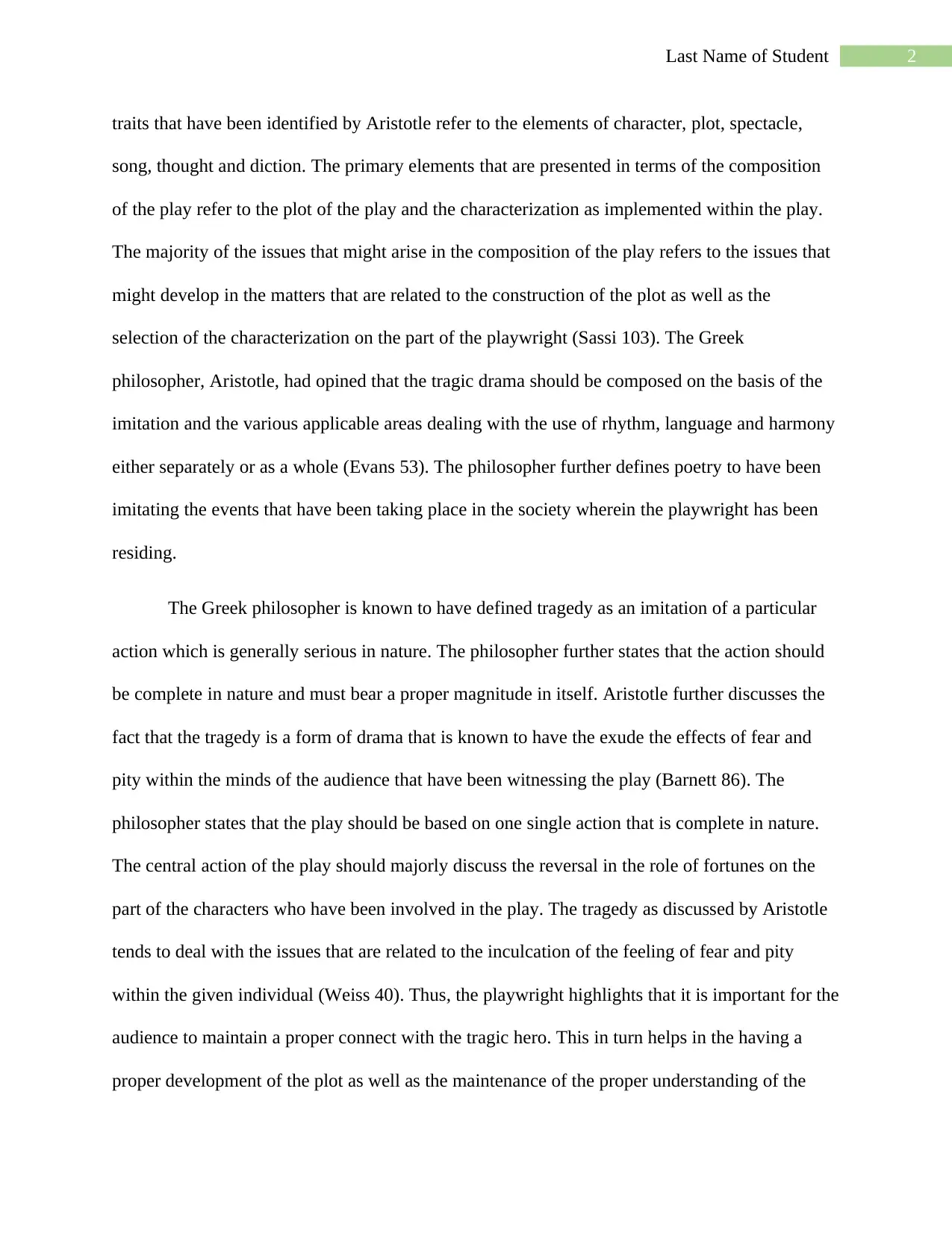
2Last Name of Student
traits that have been identified by Aristotle refer to the elements of character, plot, spectacle,
song, thought and diction. The primary elements that are presented in terms of the composition
of the play refer to the plot of the play and the characterization as implemented within the play.
The majority of the issues that might arise in the composition of the play refers to the issues that
might develop in the matters that are related to the construction of the plot as well as the
selection of the characterization on the part of the playwright (Sassi 103). The Greek
philosopher, Aristotle, had opined that the tragic drama should be composed on the basis of the
imitation and the various applicable areas dealing with the use of rhythm, language and harmony
either separately or as a whole (Evans 53). The philosopher further defines poetry to have been
imitating the events that have been taking place in the society wherein the playwright has been
residing.
The Greek philosopher is known to have defined tragedy as an imitation of a particular
action which is generally serious in nature. The philosopher further states that the action should
be complete in nature and must bear a proper magnitude in itself. Aristotle further discusses the
fact that the tragedy is a form of drama that is known to have the exude the effects of fear and
pity within the minds of the audience that have been witnessing the play (Barnett 86). The
philosopher states that the play should be based on one single action that is complete in nature.
The central action of the play should majorly discuss the reversal in the role of fortunes on the
part of the characters who have been involved in the play. The tragedy as discussed by Aristotle
tends to deal with the issues that are related to the inculcation of the feeling of fear and pity
within the given individual (Weiss 40). Thus, the playwright highlights that it is important for the
audience to maintain a proper connect with the tragic hero. This in turn helps in the having a
proper development of the plot as well as the maintenance of the proper understanding of the
traits that have been identified by Aristotle refer to the elements of character, plot, spectacle,
song, thought and diction. The primary elements that are presented in terms of the composition
of the play refer to the plot of the play and the characterization as implemented within the play.
The majority of the issues that might arise in the composition of the play refers to the issues that
might develop in the matters that are related to the construction of the plot as well as the
selection of the characterization on the part of the playwright (Sassi 103). The Greek
philosopher, Aristotle, had opined that the tragic drama should be composed on the basis of the
imitation and the various applicable areas dealing with the use of rhythm, language and harmony
either separately or as a whole (Evans 53). The philosopher further defines poetry to have been
imitating the events that have been taking place in the society wherein the playwright has been
residing.
The Greek philosopher is known to have defined tragedy as an imitation of a particular
action which is generally serious in nature. The philosopher further states that the action should
be complete in nature and must bear a proper magnitude in itself. Aristotle further discusses the
fact that the tragedy is a form of drama that is known to have the exude the effects of fear and
pity within the minds of the audience that have been witnessing the play (Barnett 86). The
philosopher states that the play should be based on one single action that is complete in nature.
The central action of the play should majorly discuss the reversal in the role of fortunes on the
part of the characters who have been involved in the play. The tragedy as discussed by Aristotle
tends to deal with the issues that are related to the inculcation of the feeling of fear and pity
within the given individual (Weiss 40). Thus, the playwright highlights that it is important for the
audience to maintain a proper connect with the tragic hero. This in turn helps in the having a
proper development of the plot as well as the maintenance of the proper understanding of the
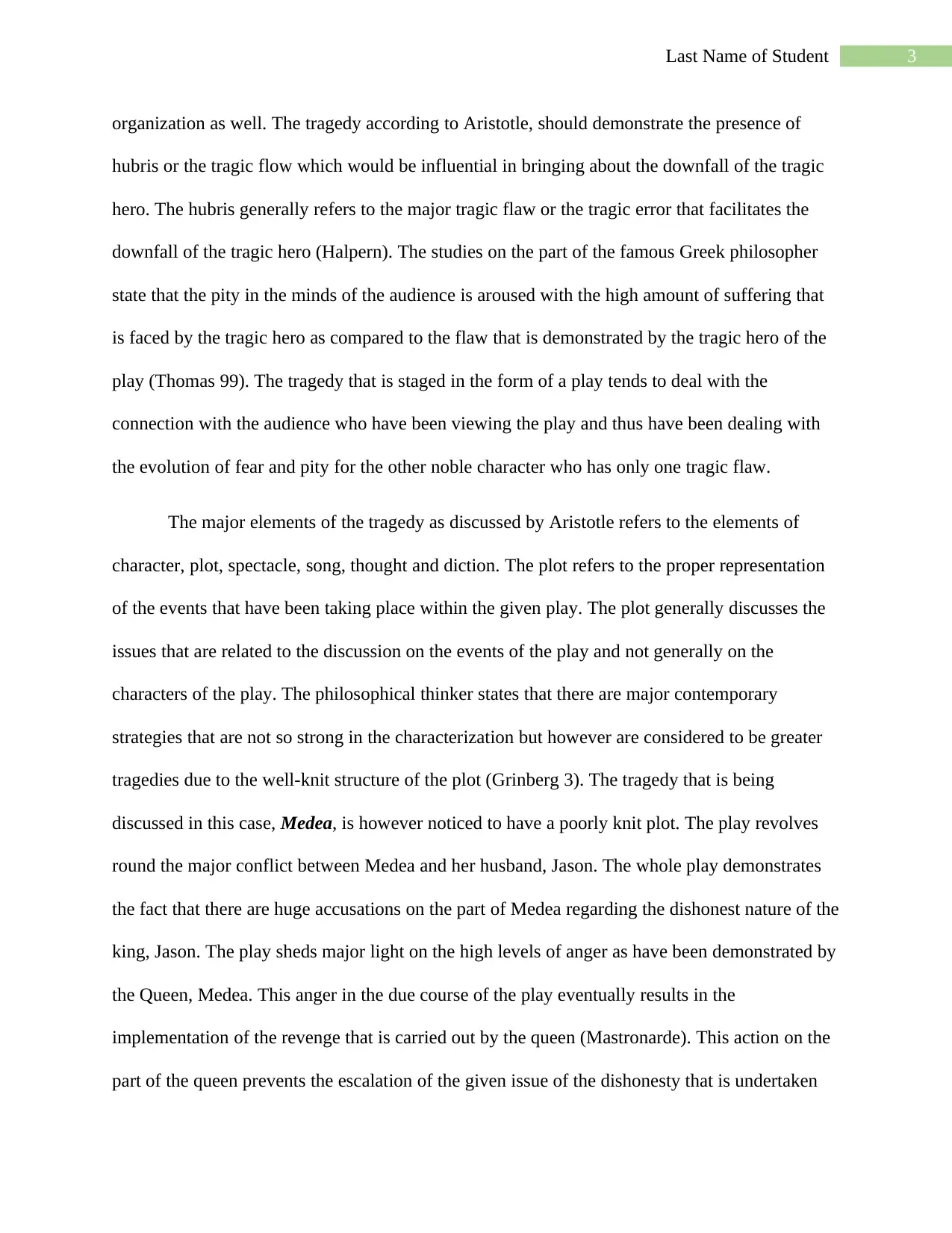
3Last Name of Student
organization as well. The tragedy according to Aristotle, should demonstrate the presence of
hubris or the tragic flow which would be influential in bringing about the downfall of the tragic
hero. The hubris generally refers to the major tragic flaw or the tragic error that facilitates the
downfall of the tragic hero (Halpern). The studies on the part of the famous Greek philosopher
state that the pity in the minds of the audience is aroused with the high amount of suffering that
is faced by the tragic hero as compared to the flaw that is demonstrated by the tragic hero of the
play (Thomas 99). The tragedy that is staged in the form of a play tends to deal with the
connection with the audience who have been viewing the play and thus have been dealing with
the evolution of fear and pity for the other noble character who has only one tragic flaw.
The major elements of the tragedy as discussed by Aristotle refers to the elements of
character, plot, spectacle, song, thought and diction. The plot refers to the proper representation
of the events that have been taking place within the given play. The plot generally discusses the
issues that are related to the discussion on the events of the play and not generally on the
characters of the play. The philosophical thinker states that there are major contemporary
strategies that are not so strong in the characterization but however are considered to be greater
tragedies due to the well-knit structure of the plot (Grinberg 3). The tragedy that is being
discussed in this case, Medea, is however noticed to have a poorly knit plot. The play revolves
round the major conflict between Medea and her husband, Jason. The whole play demonstrates
the fact that there are huge accusations on the part of Medea regarding the dishonest nature of the
king, Jason. The play sheds major light on the high levels of anger as have been demonstrated by
the Queen, Medea. This anger in the due course of the play eventually results in the
implementation of the revenge that is carried out by the queen (Mastronarde). This action on the
part of the queen prevents the escalation of the given issue of the dishonesty that is undertaken
organization as well. The tragedy according to Aristotle, should demonstrate the presence of
hubris or the tragic flow which would be influential in bringing about the downfall of the tragic
hero. The hubris generally refers to the major tragic flaw or the tragic error that facilitates the
downfall of the tragic hero (Halpern). The studies on the part of the famous Greek philosopher
state that the pity in the minds of the audience is aroused with the high amount of suffering that
is faced by the tragic hero as compared to the flaw that is demonstrated by the tragic hero of the
play (Thomas 99). The tragedy that is staged in the form of a play tends to deal with the
connection with the audience who have been viewing the play and thus have been dealing with
the evolution of fear and pity for the other noble character who has only one tragic flaw.
The major elements of the tragedy as discussed by Aristotle refers to the elements of
character, plot, spectacle, song, thought and diction. The plot refers to the proper representation
of the events that have been taking place within the given play. The plot generally discusses the
issues that are related to the discussion on the events of the play and not generally on the
characters of the play. The philosophical thinker states that there are major contemporary
strategies that are not so strong in the characterization but however are considered to be greater
tragedies due to the well-knit structure of the plot (Grinberg 3). The tragedy that is being
discussed in this case, Medea, is however noticed to have a poorly knit plot. The play revolves
round the major conflict between Medea and her husband, Jason. The whole play demonstrates
the fact that there are huge accusations on the part of Medea regarding the dishonest nature of the
king, Jason. The play sheds major light on the high levels of anger as have been demonstrated by
the Queen, Medea. This anger in the due course of the play eventually results in the
implementation of the revenge that is carried out by the queen (Mastronarde). This action on the
part of the queen prevents the escalation of the given issue of the dishonesty that is undertaken
⊘ This is a preview!⊘
Do you want full access?
Subscribe today to unlock all pages.

Trusted by 1+ million students worldwide
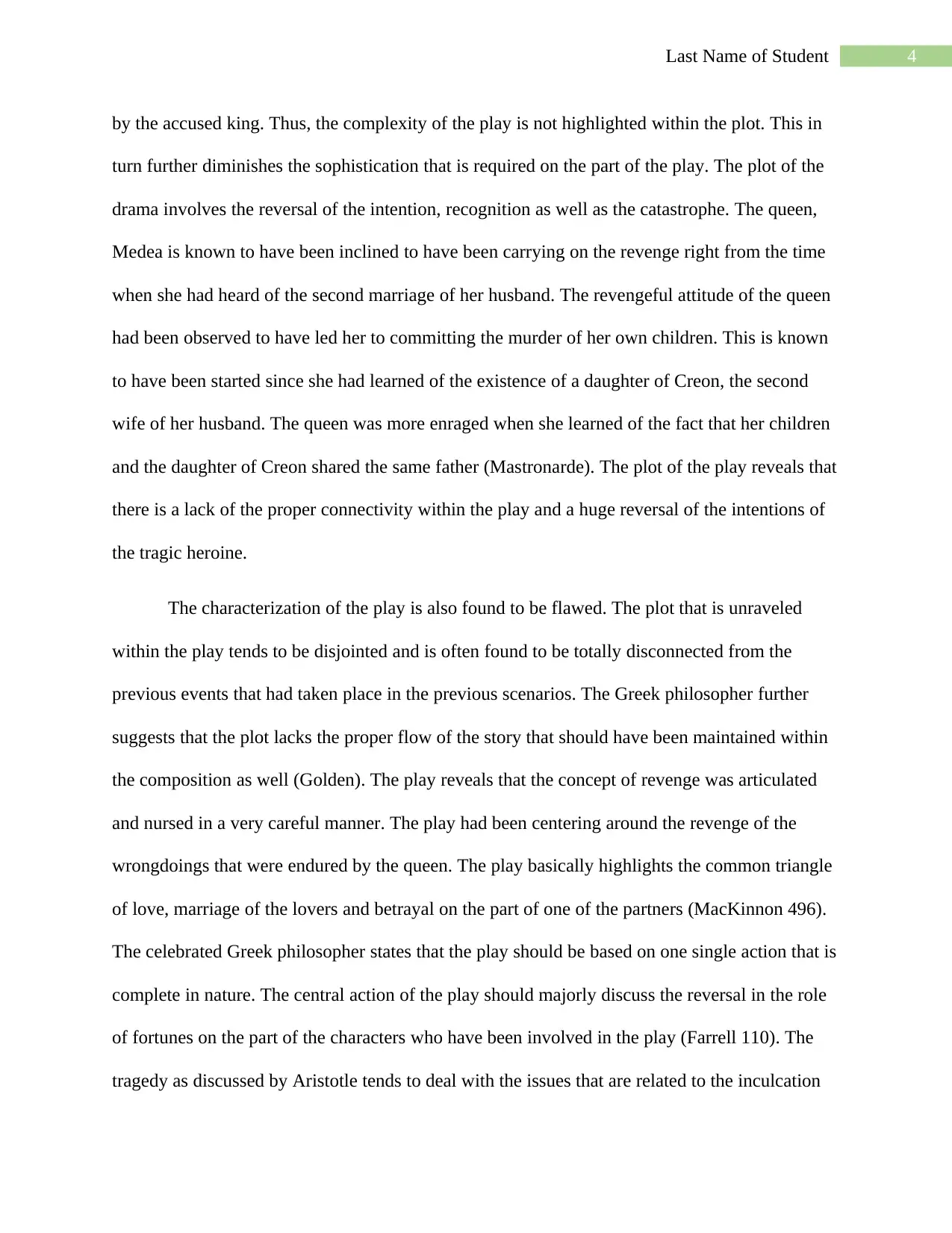
4Last Name of Student
by the accused king. Thus, the complexity of the play is not highlighted within the plot. This in
turn further diminishes the sophistication that is required on the part of the play. The plot of the
drama involves the reversal of the intention, recognition as well as the catastrophe. The queen,
Medea is known to have been inclined to have been carrying on the revenge right from the time
when she had heard of the second marriage of her husband. The revengeful attitude of the queen
had been observed to have led her to committing the murder of her own children. This is known
to have been started since she had learned of the existence of a daughter of Creon, the second
wife of her husband. The queen was more enraged when she learned of the fact that her children
and the daughter of Creon shared the same father (Mastronarde). The plot of the play reveals that
there is a lack of the proper connectivity within the play and a huge reversal of the intentions of
the tragic heroine.
The characterization of the play is also found to be flawed. The plot that is unraveled
within the play tends to be disjointed and is often found to be totally disconnected from the
previous events that had taken place in the previous scenarios. The Greek philosopher further
suggests that the plot lacks the proper flow of the story that should have been maintained within
the composition as well (Golden). The play reveals that the concept of revenge was articulated
and nursed in a very careful manner. The play had been centering around the revenge of the
wrongdoings that were endured by the queen. The play basically highlights the common triangle
of love, marriage of the lovers and betrayal on the part of one of the partners (MacKinnon 496).
The celebrated Greek philosopher states that the play should be based on one single action that is
complete in nature. The central action of the play should majorly discuss the reversal in the role
of fortunes on the part of the characters who have been involved in the play (Farrell 110). The
tragedy as discussed by Aristotle tends to deal with the issues that are related to the inculcation
by the accused king. Thus, the complexity of the play is not highlighted within the plot. This in
turn further diminishes the sophistication that is required on the part of the play. The plot of the
drama involves the reversal of the intention, recognition as well as the catastrophe. The queen,
Medea is known to have been inclined to have been carrying on the revenge right from the time
when she had heard of the second marriage of her husband. The revengeful attitude of the queen
had been observed to have led her to committing the murder of her own children. This is known
to have been started since she had learned of the existence of a daughter of Creon, the second
wife of her husband. The queen was more enraged when she learned of the fact that her children
and the daughter of Creon shared the same father (Mastronarde). The plot of the play reveals that
there is a lack of the proper connectivity within the play and a huge reversal of the intentions of
the tragic heroine.
The characterization of the play is also found to be flawed. The plot that is unraveled
within the play tends to be disjointed and is often found to be totally disconnected from the
previous events that had taken place in the previous scenarios. The Greek philosopher further
suggests that the plot lacks the proper flow of the story that should have been maintained within
the composition as well (Golden). The play reveals that the concept of revenge was articulated
and nursed in a very careful manner. The play had been centering around the revenge of the
wrongdoings that were endured by the queen. The play basically highlights the common triangle
of love, marriage of the lovers and betrayal on the part of one of the partners (MacKinnon 496).
The celebrated Greek philosopher states that the play should be based on one single action that is
complete in nature. The central action of the play should majorly discuss the reversal in the role
of fortunes on the part of the characters who have been involved in the play (Farrell 110). The
tragedy as discussed by Aristotle tends to deal with the issues that are related to the inculcation
Paraphrase This Document
Need a fresh take? Get an instant paraphrase of this document with our AI Paraphraser
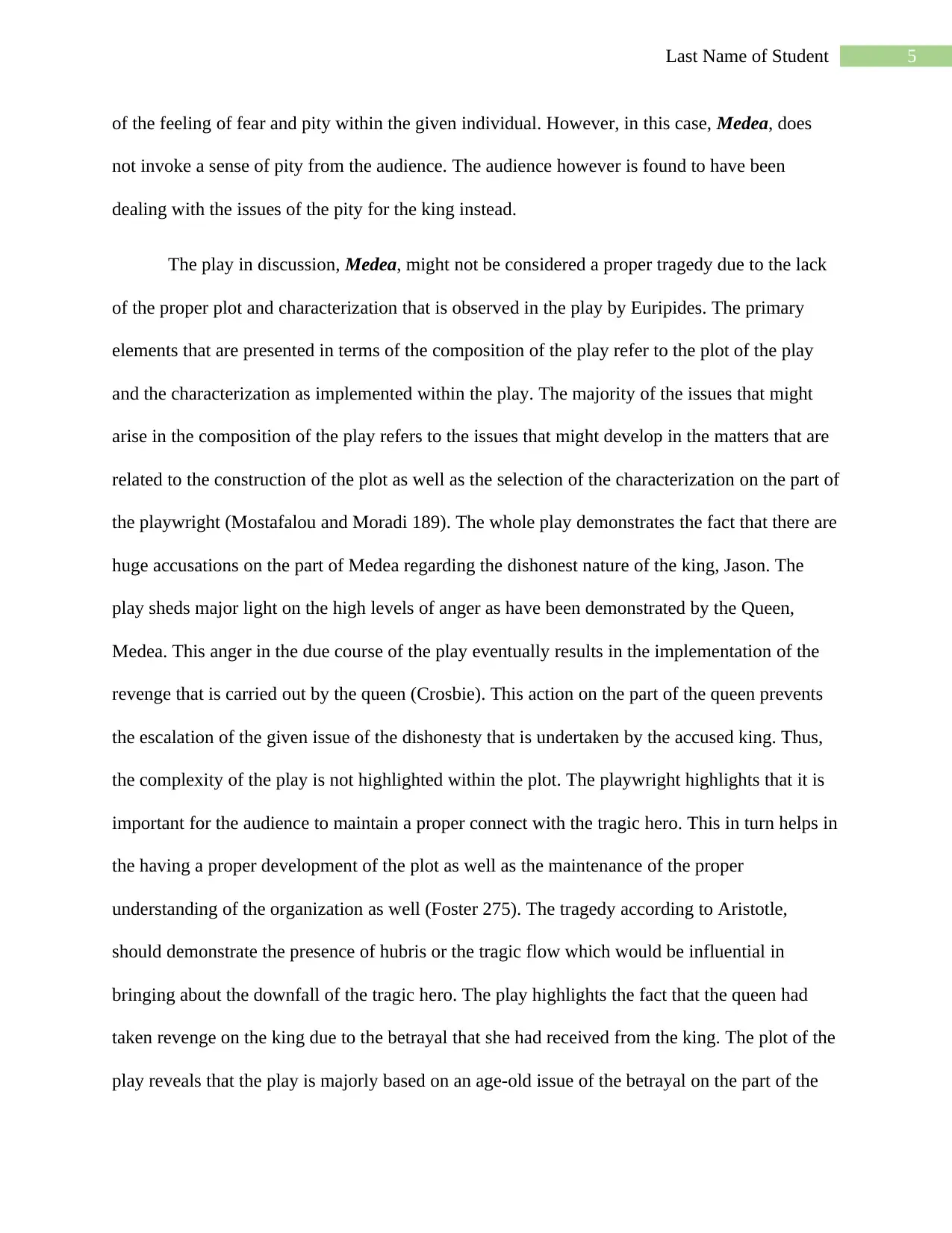
5Last Name of Student
of the feeling of fear and pity within the given individual. However, in this case, Medea, does
not invoke a sense of pity from the audience. The audience however is found to have been
dealing with the issues of the pity for the king instead.
The play in discussion, Medea, might not be considered a proper tragedy due to the lack
of the proper plot and characterization that is observed in the play by Euripides. The primary
elements that are presented in terms of the composition of the play refer to the plot of the play
and the characterization as implemented within the play. The majority of the issues that might
arise in the composition of the play refers to the issues that might develop in the matters that are
related to the construction of the plot as well as the selection of the characterization on the part of
the playwright (Mostafalou and Moradi 189). The whole play demonstrates the fact that there are
huge accusations on the part of Medea regarding the dishonest nature of the king, Jason. The
play sheds major light on the high levels of anger as have been demonstrated by the Queen,
Medea. This anger in the due course of the play eventually results in the implementation of the
revenge that is carried out by the queen (Crosbie). This action on the part of the queen prevents
the escalation of the given issue of the dishonesty that is undertaken by the accused king. Thus,
the complexity of the play is not highlighted within the plot. The playwright highlights that it is
important for the audience to maintain a proper connect with the tragic hero. This in turn helps in
the having a proper development of the plot as well as the maintenance of the proper
understanding of the organization as well (Foster 275). The tragedy according to Aristotle,
should demonstrate the presence of hubris or the tragic flow which would be influential in
bringing about the downfall of the tragic hero. The play highlights the fact that the queen had
taken revenge on the king due to the betrayal that she had received from the king. The plot of the
play reveals that the play is majorly based on an age-old issue of the betrayal on the part of the
of the feeling of fear and pity within the given individual. However, in this case, Medea, does
not invoke a sense of pity from the audience. The audience however is found to have been
dealing with the issues of the pity for the king instead.
The play in discussion, Medea, might not be considered a proper tragedy due to the lack
of the proper plot and characterization that is observed in the play by Euripides. The primary
elements that are presented in terms of the composition of the play refer to the plot of the play
and the characterization as implemented within the play. The majority of the issues that might
arise in the composition of the play refers to the issues that might develop in the matters that are
related to the construction of the plot as well as the selection of the characterization on the part of
the playwright (Mostafalou and Moradi 189). The whole play demonstrates the fact that there are
huge accusations on the part of Medea regarding the dishonest nature of the king, Jason. The
play sheds major light on the high levels of anger as have been demonstrated by the Queen,
Medea. This anger in the due course of the play eventually results in the implementation of the
revenge that is carried out by the queen (Crosbie). This action on the part of the queen prevents
the escalation of the given issue of the dishonesty that is undertaken by the accused king. Thus,
the complexity of the play is not highlighted within the plot. The playwright highlights that it is
important for the audience to maintain a proper connect with the tragic hero. This in turn helps in
the having a proper development of the plot as well as the maintenance of the proper
understanding of the organization as well (Foster 275). The tragedy according to Aristotle,
should demonstrate the presence of hubris or the tragic flow which would be influential in
bringing about the downfall of the tragic hero. The play highlights the fact that the queen had
taken revenge on the king due to the betrayal that she had received from the king. The plot of the
play reveals that the play is majorly based on an age-old issue of the betrayal on the part of the
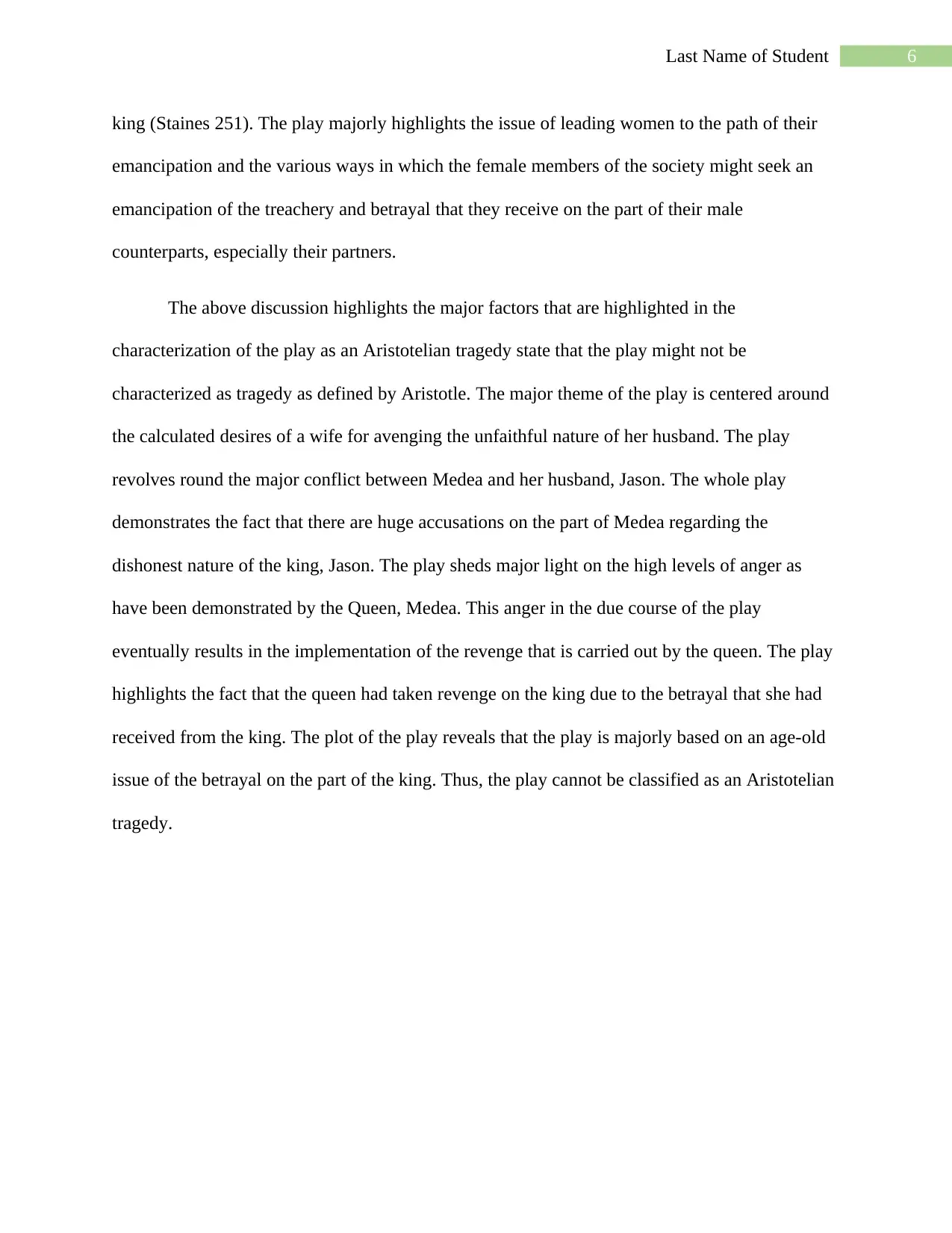
6Last Name of Student
king (Staines 251). The play majorly highlights the issue of leading women to the path of their
emancipation and the various ways in which the female members of the society might seek an
emancipation of the treachery and betrayal that they receive on the part of their male
counterparts, especially their partners.
The above discussion highlights the major factors that are highlighted in the
characterization of the play as an Aristotelian tragedy state that the play might not be
characterized as tragedy as defined by Aristotle. The major theme of the play is centered around
the calculated desires of a wife for avenging the unfaithful nature of her husband. The play
revolves round the major conflict between Medea and her husband, Jason. The whole play
demonstrates the fact that there are huge accusations on the part of Medea regarding the
dishonest nature of the king, Jason. The play sheds major light on the high levels of anger as
have been demonstrated by the Queen, Medea. This anger in the due course of the play
eventually results in the implementation of the revenge that is carried out by the queen. The play
highlights the fact that the queen had taken revenge on the king due to the betrayal that she had
received from the king. The plot of the play reveals that the play is majorly based on an age-old
issue of the betrayal on the part of the king. Thus, the play cannot be classified as an Aristotelian
tragedy.
king (Staines 251). The play majorly highlights the issue of leading women to the path of their
emancipation and the various ways in which the female members of the society might seek an
emancipation of the treachery and betrayal that they receive on the part of their male
counterparts, especially their partners.
The above discussion highlights the major factors that are highlighted in the
characterization of the play as an Aristotelian tragedy state that the play might not be
characterized as tragedy as defined by Aristotle. The major theme of the play is centered around
the calculated desires of a wife for avenging the unfaithful nature of her husband. The play
revolves round the major conflict between Medea and her husband, Jason. The whole play
demonstrates the fact that there are huge accusations on the part of Medea regarding the
dishonest nature of the king, Jason. The play sheds major light on the high levels of anger as
have been demonstrated by the Queen, Medea. This anger in the due course of the play
eventually results in the implementation of the revenge that is carried out by the queen. The play
highlights the fact that the queen had taken revenge on the king due to the betrayal that she had
received from the king. The plot of the play reveals that the play is majorly based on an age-old
issue of the betrayal on the part of the king. Thus, the play cannot be classified as an Aristotelian
tragedy.
⊘ This is a preview!⊘
Do you want full access?
Subscribe today to unlock all pages.

Trusted by 1+ million students worldwide
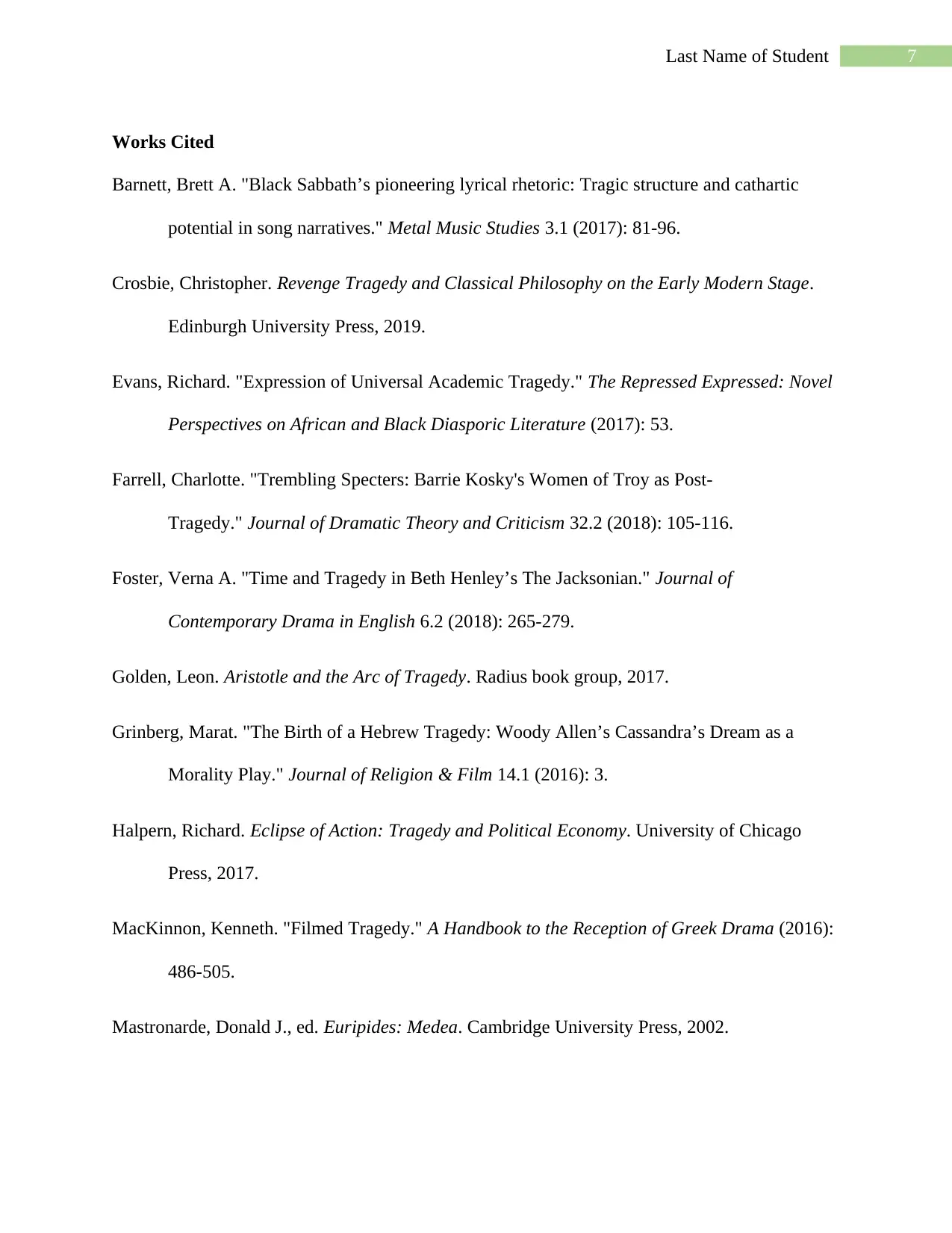
7Last Name of Student
Works Cited
Barnett, Brett A. "Black Sabbath’s pioneering lyrical rhetoric: Tragic structure and cathartic
potential in song narratives." Metal Music Studies 3.1 (2017): 81-96.
Crosbie, Christopher. Revenge Tragedy and Classical Philosophy on the Early Modern Stage.
Edinburgh University Press, 2019.
Evans, Richard. "Expression of Universal Academic Tragedy." The Repressed Expressed: Novel
Perspectives on African and Black Diasporic Literature (2017): 53.
Farrell, Charlotte. "Trembling Specters: Barrie Kosky's Women of Troy as Post-
Tragedy." Journal of Dramatic Theory and Criticism 32.2 (2018): 105-116.
Foster, Verna A. "Time and Tragedy in Beth Henley’s The Jacksonian." Journal of
Contemporary Drama in English 6.2 (2018): 265-279.
Golden, Leon. Aristotle and the Arc of Tragedy. Radius book group, 2017.
Grinberg, Marat. "The Birth of a Hebrew Tragedy: Woody Allen’s Cassandra’s Dream as a
Morality Play." Journal of Religion & Film 14.1 (2016): 3.
Halpern, Richard. Eclipse of Action: Tragedy and Political Economy. University of Chicago
Press, 2017.
MacKinnon, Kenneth. "Filmed Tragedy." A Handbook to the Reception of Greek Drama (2016):
486-505.
Mastronarde, Donald J., ed. Euripides: Medea. Cambridge University Press, 2002.
Works Cited
Barnett, Brett A. "Black Sabbath’s pioneering lyrical rhetoric: Tragic structure and cathartic
potential in song narratives." Metal Music Studies 3.1 (2017): 81-96.
Crosbie, Christopher. Revenge Tragedy and Classical Philosophy on the Early Modern Stage.
Edinburgh University Press, 2019.
Evans, Richard. "Expression of Universal Academic Tragedy." The Repressed Expressed: Novel
Perspectives on African and Black Diasporic Literature (2017): 53.
Farrell, Charlotte. "Trembling Specters: Barrie Kosky's Women of Troy as Post-
Tragedy." Journal of Dramatic Theory and Criticism 32.2 (2018): 105-116.
Foster, Verna A. "Time and Tragedy in Beth Henley’s The Jacksonian." Journal of
Contemporary Drama in English 6.2 (2018): 265-279.
Golden, Leon. Aristotle and the Arc of Tragedy. Radius book group, 2017.
Grinberg, Marat. "The Birth of a Hebrew Tragedy: Woody Allen’s Cassandra’s Dream as a
Morality Play." Journal of Religion & Film 14.1 (2016): 3.
Halpern, Richard. Eclipse of Action: Tragedy and Political Economy. University of Chicago
Press, 2017.
MacKinnon, Kenneth. "Filmed Tragedy." A Handbook to the Reception of Greek Drama (2016):
486-505.
Mastronarde, Donald J., ed. Euripides: Medea. Cambridge University Press, 2002.
Paraphrase This Document
Need a fresh take? Get an instant paraphrase of this document with our AI Paraphraser
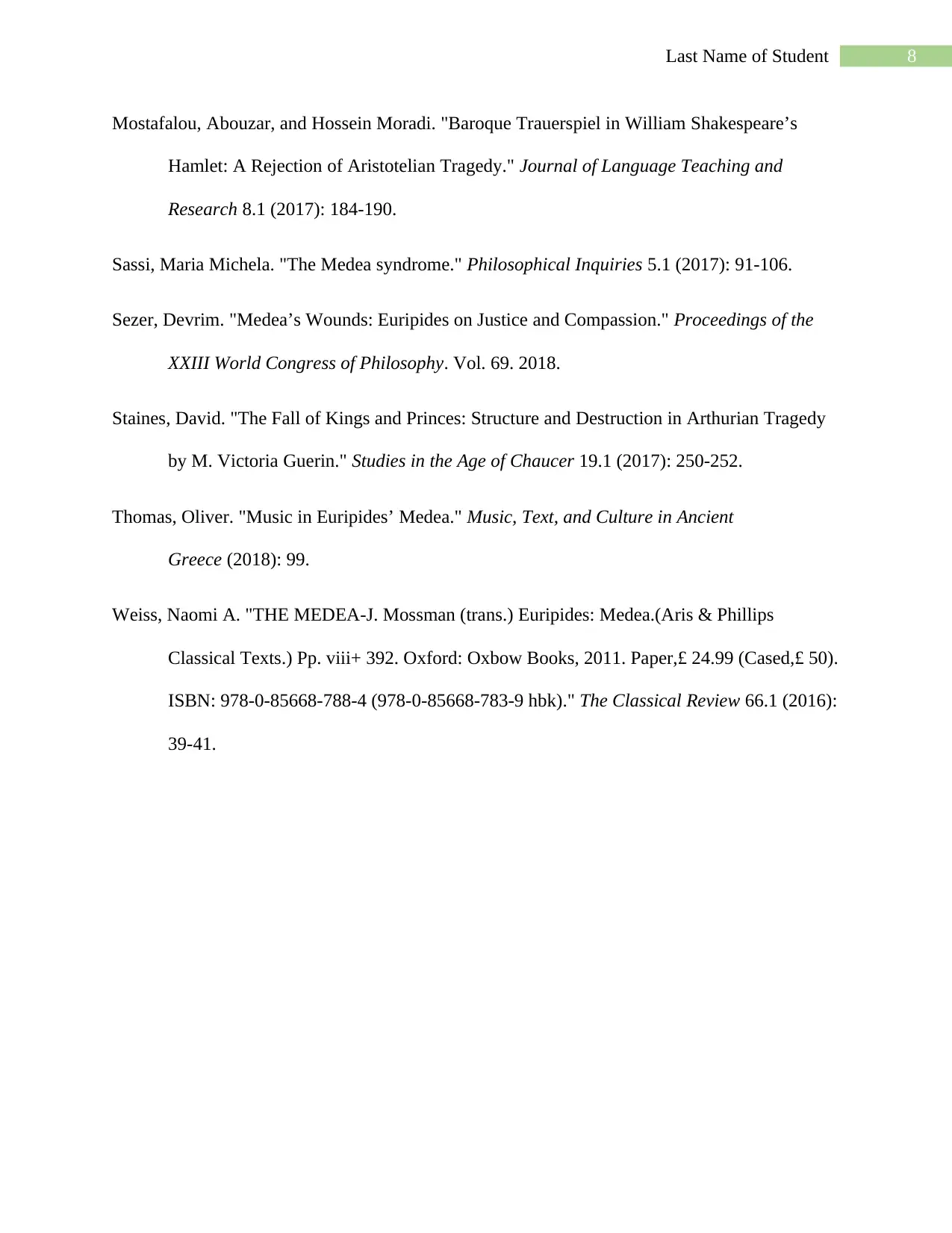
8Last Name of Student
Mostafalou, Abouzar, and Hossein Moradi. "Baroque Trauerspiel in William Shakespeare’s
Hamlet: A Rejection of Aristotelian Tragedy." Journal of Language Teaching and
Research 8.1 (2017): 184-190.
Sassi, Maria Michela. "The Medea syndrome." Philosophical Inquiries 5.1 (2017): 91-106.
Sezer, Devrim. "Medea’s Wounds: Euripides on Justice and Compassion." Proceedings of the
XXIII World Congress of Philosophy. Vol. 69. 2018.
Staines, David. "The Fall of Kings and Princes: Structure and Destruction in Arthurian Tragedy
by M. Victoria Guerin." Studies in the Age of Chaucer 19.1 (2017): 250-252.
Thomas, Oliver. "Music in Euripides’ Medea." Music, Text, and Culture in Ancient
Greece (2018): 99.
Weiss, Naomi A. "THE MEDEA-J. Mossman (trans.) Euripides: Medea.(Aris & Phillips
Classical Texts.) Pp. viii+ 392. Oxford: Oxbow Books, 2011. Paper,£ 24.99 (Cased,£ 50).
ISBN: 978-0-85668-788-4 (978-0-85668-783-9 hbk)." The Classical Review 66.1 (2016):
39-41.
Mostafalou, Abouzar, and Hossein Moradi. "Baroque Trauerspiel in William Shakespeare’s
Hamlet: A Rejection of Aristotelian Tragedy." Journal of Language Teaching and
Research 8.1 (2017): 184-190.
Sassi, Maria Michela. "The Medea syndrome." Philosophical Inquiries 5.1 (2017): 91-106.
Sezer, Devrim. "Medea’s Wounds: Euripides on Justice and Compassion." Proceedings of the
XXIII World Congress of Philosophy. Vol. 69. 2018.
Staines, David. "The Fall of Kings and Princes: Structure and Destruction in Arthurian Tragedy
by M. Victoria Guerin." Studies in the Age of Chaucer 19.1 (2017): 250-252.
Thomas, Oliver. "Music in Euripides’ Medea." Music, Text, and Culture in Ancient
Greece (2018): 99.
Weiss, Naomi A. "THE MEDEA-J. Mossman (trans.) Euripides: Medea.(Aris & Phillips
Classical Texts.) Pp. viii+ 392. Oxford: Oxbow Books, 2011. Paper,£ 24.99 (Cased,£ 50).
ISBN: 978-0-85668-788-4 (978-0-85668-783-9 hbk)." The Classical Review 66.1 (2016):
39-41.
1 out of 8
Your All-in-One AI-Powered Toolkit for Academic Success.
+13062052269
info@desklib.com
Available 24*7 on WhatsApp / Email
![[object Object]](/_next/static/media/star-bottom.7253800d.svg)
Unlock your academic potential
Copyright © 2020–2025 A2Z Services. All Rights Reserved. Developed and managed by ZUCOL.


